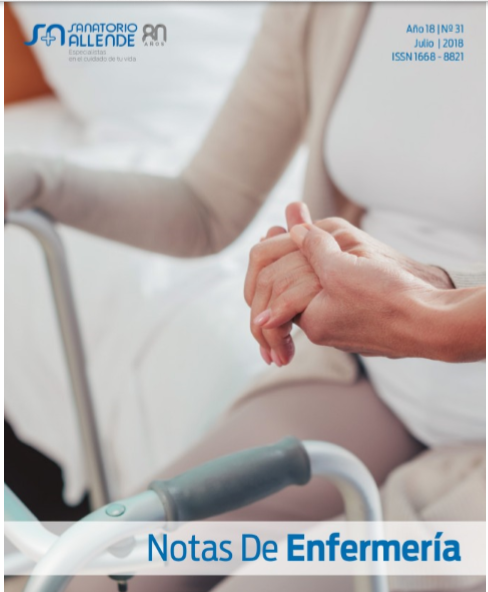Experience and Perception of parents with regard to care in Children with Internation in ICU.
DOI:
https://doi.org/10.59843/2618-3692.v18.n31.21657Keywords:
Intensive Care Unit, experience, perception, nursing careAbstract
Summary: Introduction: Some children have health problems that lead them to enter an Intensive Care Unit (ICU), they are patients that require a high level of care. The income in this type of units, which can be changed from one year ago in primary care as Family-Centered Care, focuses on the fact that this income not only directly affects the child and also their parents, who see altered their ideals, their role, the relationships of bond, provoking situations of stress, anguish and anxiety. Objective: This research aims to analyze the perceptions of fathers and mothers with children (admitted to the Intensive Care Unit). Methodology: a qualitative methodology supported by the phenomenological paradigm was used, which complained about the meaning of the experience lived by families in order to know the reality they experience. The study population parents and mothers who have a child admitted to the ICU of the Sanatorium Allende. To this end, in-depth interviews were conducted and recorded using an audio system. Conclusions: The main conclusions allowed to identify that the experience and the perception of the parents about the nursing care, according to the order of hierarchy granted, are related to: Emotional support, Coordination and integration of the care, Information, education and participation of the family, Physical comfort, support for daily activities.
Downloads
References
1. Institute of Medicine. America’s health in transition: protecting and improving quality. Washington DC: Institute of Medicine, 1994.
2. American Academy of Pediatrics.Principles for the development and use of quality measures. Pediatrics 2008;121(2):411-8.
3. Cleary PD. The increasing importance of patient surveys: now that sounds that methods exist, patient surveys can facilitate improvement. BMJ 1999;319(7212):720-1.
4. De Silva A. A framework for measuring responsiveness.GPE Discussion Paper Series N° 32. [Acceso: 8 febrero 2012]. Disponible en: http://www.who.int/healthinfo/ paper32.pdf.
5. Thompson AG, Suñol R. Expectations as determinants of patient’s satisfaction: concepts, theory and evidence. Int J Qual Health Care 1995;7(2):127-41.
6. Linder Pelz S. Toward a theory of patient satisfaction. SocSci Med 1982;16(5):577-82.
7. Perneger T. Adjustment for patient’s characteristics in satisfaction surveys. Int J Qual Health Care 2004;16(6):433-5.
8. LatourJM, van Goudoever, Hazelzet J. Parent satisfaction in the Pediatric ICU.PediatrClin North Am 2008;55(3):779-90, xii-xiii.
9. Latour JM,Hazelzet J, Van Der Heijden A. Parent satisfaction in pediatric intensive are: a critical appraisal of the literature. PediatrCrit Care Med 2005;6(5):578-84.
10. Mcherson M, Sachdeva R, Jefferson L. Development of a survey to measure parent satisfaction in a pediatric intensive care unit. Crit Care Med 2000;28(8):3009-13. d F, Chevret S, Lemaire F, et al. Meeting the needs of Intensive Care Unit patient families: a multicenter study. Am J Respir Crit Care Med 2001;163(1):135-9.
11. Harvey picker, centre of innovation and applied research in long term care (2013). person centered long term care literature brief.Derby,ct planetime
12. Harvey picker, person centered long term care literatura brief (2013). Derby, ct planetime
13. Kolcaba K. The Art of Comfort Care. Image: Journal of Nursing Scholarship, 27(4):287-289, 1995
14. Grooper L. Promoting health by promoting comfort. Nursing Forum, 27(2): 5-8, 1992
15. Rivera L, Triana A. Percepción de comportamientos de cuidado humanizado de enfermería en la clínica del country. Av Enfermería. 2007; XXV; (1):56-68.
16. Caetano J, Andrade L, Soares E, Ponte R. Cuidado humanizado en terapia intensiva: un estudio reflexivo. Revista de Enferm. 2007; 11(2):325-30.
17. VIEIRA G., Matías. La Iniciativa de Humanización de Cuidados Neonatales. Rev. chil. pediatr. [online]. 2003, vol.74, n.2 pp. 197-205. [citado 04/11/2010]
Downloads
Published
Issue
Section
License
Copyright (c) 2018 Sanatorio Allende

This work is licensed under a Creative Commons Attribution-NonCommercial 4.0 International License.
Those authors who have published with this journal, accept the following terms:
- Attribution — You must give appropriate credit, provide a link to the license, and indicate if changes were made. You may do so in any reasonable manner, but not in any way that suggests the licensor endorses you or your use.
- NonCommercial — You may not use the material for commercial purposes.

